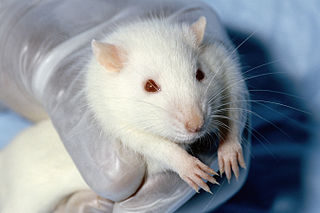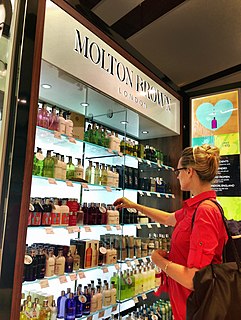
Cosmetics are substances or products used to enhance or alter the appearance of the face or fragrance and texture of the body. Many cosmetics are designed for use of applying to the face, hair, and body. They are generally mixtures of chemical compounds; some being derived from natural sources, and some being synthetics or artificial. Cosmetics applied to the face to enhance its appearance are often called make-up or makeup. Common make-up items include: lipstick, mascara, eye shadow, foundation, blush, and contour. Whereas other common cosmetics can include skin cleansers, body lotions, shampoo and conditioner, hairstyling products, perfume and cologne.

In the animal rights movement, cruelty-free is a label for products or activities that do not harm or kill animals anywhere in the world. Products tested on animals are not considered cruelty-free, since these tests are often painful and cause the suffering and death of millions of animals every year.

The Body Shop International Limited, trading as The Body Shop, is a British cosmetics, skin care and perfume company that was founded in 1976 by Dame Anita Roddick. It currently has a range of 1,000 products which it sells in over 3,049 owned and franchised stores internationally in 66 countries. The company is based in East Croydon and Littlehampton, West Sussex.
Lush is a cosmetics retailer headquartered in Poole, Dorset, United Kingdom. The company was founded by Mark Constantine, a trichologist, and Liz Weir, a beauty therapist. They met in a hair and beauty salon in Poole, UK. A few years later, they decided to branch out and start their own business selling natural hair and beauty products.

Urban Decay, an American cosmetics brand headquartered in Newport Beach, California, is a subsidiary of French cosmetics company L'Oréal.

Ecover is a Belgian company that manufactures ecologically sound cleaning products and is owned by S. C. Johnson & Son.

Cosmetics ingredients come from a variety of sources but, unlike the ingredients of food, are often not considered by most consumers. Cosmetics often use vibrant colors that are derived from a wide variety of sources, ranging from crushed insects to rust.

Molton Brown is a British fragrance and personal care brand founded in 1973 by Caroline Burstein and Michael Collis. Known for its perfumes, home, and bath and body products the brand was acquired by the KAO Corporation in 2005.
Almay is a cosmetics brand owned by Revlon which markets toward people with sensitive skin.
Council Directive 76/768/EEC of 1976-07-27 on the approximation of the laws of the Member States relating to cosmetic products is the main European Union law on the safety of cosmetics. It was made under Art. 100 of the Treaty of Rome. By agreement, it is also applicable in the European Economic Area.

BB cream is a marketing term that stands for blemish balm, blemish base, beblesh balm, and in Western markets, beauty balm. Products marketed as BB creams are generally designed to serve as a foundation, moisturizer, and sunscreen all at once.
Beauty Without Cruelty (BWC) is a British company that manufactures vegan cosmetics. The cosmetics contain no animal products and are not tested on animals.
The New England Anti-Vivisection Society (NEAVS) is a national, registered 501(c)(3) nonprofit organization “dedicated to ending the use of animals in research, testing, and science education” and replacing them with "modern alternatives that are ethically, humanely, and scientifically superior."

The cosmetic industry is dominated by a small number of multinational corporations that originated in the early 20th century, but the distribution and sale of cosmetics is spread among a wide range of different businesses. The largest cosmetic companies are The L'Oréal Group, The Procter & Gamble Company, Unilever, Shiseido Company, Limited and Estée Lauder Companies, Inc. The market volume of the cosmetics industry in the United States, Europe, and Japan is about EUR €70b per year, according to a 2005 publication. The worldwide cosmetics and perfume industry currently generates an estimated annual turnover of US$170 billion. Europe is the leading market, representing approximately €63 billion. Within the United States, the state of California has the largest concentration of beauty establishments in America at 25.5%, followed by New Jersey at 8.1% of American beauty establishments. California is has largest concentration due to social media marketing from celebrities and ‘beauty gurus’. For example, Kylie Jenner’s company Kylie Cosmetics, is valued at $800 million and sold an estimated $330 million worth of makeup in 2017. Youtube and social media influencers Jeffree Star, and Michelle Phan (Ipsy), and pop-star Rihanna with her Fenty Beauty line of cosmetics, have also contributed to California’s rising popularity in the beauty industry.
Animal welfare and rights in France is about the treatment of and laws concerning non-human animals in France. France has moderate animal welfare protections by international standards.

The term cosmetic packaging is used for cosmetic containers and secondary packaging of fragrances and cosmetic products. Cosmetic products are substances intended for human cleansing, beautifying and promoting an enhanced appearance without altering the body's structure or functions.
Cruelty-free cosmetics is a category containing all cosmetics that have not been tested on animals. The FDA has not approved a legal definition that binds this term to a certain set of criteria, making it difficult to define. However, in addition to the final product, most advocates for cruelty-free beauty agree that none of the ingredients used in the production of the cosmetic can be tested on animals in order for it to be truly cruelty-free, despite the fact that many companies who brand themselves as such still use raw materials that have been tested on animals. Therefore, it is most useful to define the term according to group consensus within the community rather than using government-promoted definitions.










